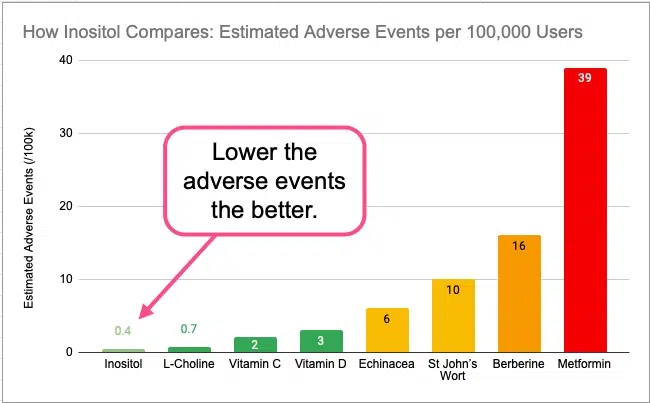Yes inositol is recognised as generally safe when used in recommended doses.
Compared to other products, the adverse events per 100,000 users is nearly 100 times lower than other common treatments like MF.

|
Substance |
Estimated Adverse Events (/100k) |
|---|---|
|
Inositol |
0.4 |
|
L-Choline |
0.7 |
|
Vitamin C |
2 |
|
Vitamin D |
3 |
|
Echinacea |
6 |
|
St John’s Wort |
10 |
|
Berberine |
16 |
|
Metformin |
39 |
References:
-
Australian Government Department of Health and Aged Care. (n.d.). Database of Adverse Event Notifications (DAEN). Therapeutic Goods Administration. https://www.tga.gov.au/safety/database-adverse-event-notifications-daen
-
Cavicchia, M. L., et al. (2019). Safety and tolerability of inositol supplementation in clinical practice: A systematic review. International Journal of Endocrinology, 2019, 1–9. https://doi.org/10.1155/2019/2532583
-
Kennedy, D. O. (2016). B vitamins and the brain: Mechanisms, dose and efficacy—A review. Nutrients, 8(2), 68. https://doi.org/10.3390/nu8020068
-
Ernst, E. (2002). Adverse effects of herbal drugs in dermatology. British Journal of Dermatology, 146(6), 929–936. https://doi.org/10.1046/j.1365-2133.2002.04770.x
-
Nathan, D. M., et al. (2006). Medical management of hyperglycemia in type 2 diabetes: A consensus algorithm. Diabetes Care, 29(8), 1963–1972. https://doi.org/10.2337/dc06-9912